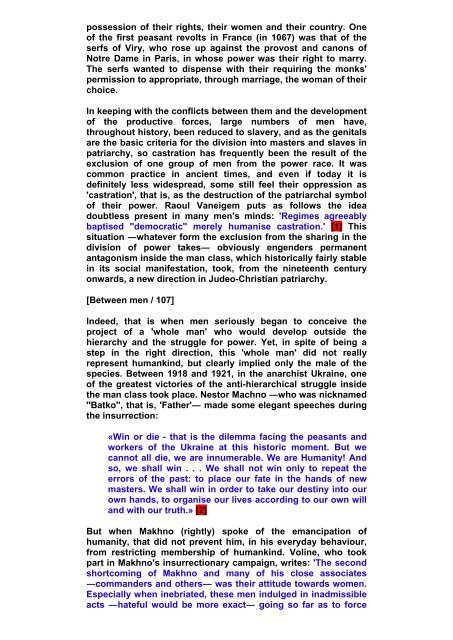emmanuel reynaud holy virility the social construction of masculinity
emmanuel reynaud holy virility the social construction of masculinity
emmanuel reynaud holy virility the social construction of masculinity
Create successful ePaper yourself
Turn your PDF publications into a flip-book with our unique Google optimized e-Paper software.
possession <strong>of</strong> <strong>the</strong>ir rights, <strong>the</strong>ir women and <strong>the</strong>ir country. One<br />
<strong>of</strong> <strong>the</strong> first peasant revolts in France (in 1067) was that <strong>of</strong> <strong>the</strong><br />
serfs <strong>of</strong> Viry, who rose up against <strong>the</strong> provost and canons <strong>of</strong><br />
Notre Dame in Paris, in whose power was <strong>the</strong>ir right to marry.<br />
The serfs wanted to dispense with <strong>the</strong>ir requiring <strong>the</strong> monks'<br />
permission to appropriate, through marriage, <strong>the</strong> woman <strong>of</strong> <strong>the</strong>ir<br />
choice.<br />
In keeping with <strong>the</strong> conflicts between <strong>the</strong>m and <strong>the</strong> development<br />
<strong>of</strong> <strong>the</strong> productive forces, large numbers <strong>of</strong> men have,<br />
throughout history, been reduced to slavery, and as <strong>the</strong> genitals<br />
are <strong>the</strong> basic criteria for <strong>the</strong> division into masters and slaves in<br />
patriarchy, so castration has frequently been <strong>the</strong> result <strong>of</strong> <strong>the</strong><br />
exclusion <strong>of</strong> one group <strong>of</strong> men from <strong>the</strong> power race. It was<br />
common practice in ancient times, and even if today it is<br />
definitely less widespread, some still feel <strong>the</strong>ir oppression as<br />
'castration', that is, as <strong>the</strong> destruction <strong>of</strong> <strong>the</strong> patriarchal symbol<br />
<strong>of</strong> <strong>the</strong>ir power. Raoul Vaneigem puts as follows <strong>the</strong> idea<br />
doubtless present in many men's minds: 'Regimes agreeably<br />
baptised "democratic'' merely humanise castration.' [1] This<br />
situation ―whatever form <strong>the</strong> exclusion from <strong>the</strong> sharing in <strong>the</strong><br />
division <strong>of</strong> power takes― obviously engenders permanent<br />
antagonism inside <strong>the</strong> man class, which historically fairly stable<br />
in its <strong>social</strong> manifestation, took, from <strong>the</strong> nineteenth century<br />
onwards, a new direction in Judeo-Christian patriarchy.<br />
[Between men / 107]<br />
Indeed, that is when men seriously began to conceive <strong>the</strong><br />
project <strong>of</strong> a 'whole man' who would develop outside <strong>the</strong><br />
hierarchy and <strong>the</strong> struggle for power. Yet, in spite <strong>of</strong> being a<br />
step in <strong>the</strong> right direction, this 'whole man' did not really<br />
represent humankind, but clearly implied only <strong>the</strong> male <strong>of</strong> <strong>the</strong><br />
species. Between 1918 and 1921, in <strong>the</strong> anarchist Ukraine, one<br />
<strong>of</strong> <strong>the</strong> greatest victories <strong>of</strong> <strong>the</strong> anti-hierarchical struggle inside<br />
<strong>the</strong> man class took place. Nestor Machno ―who was nicknamed<br />
''Batko'', that is, 'Fa<strong>the</strong>r'― made some elegant speeches during<br />
<strong>the</strong> insurrection:<br />
«Win or die - that is <strong>the</strong> dilemma facing <strong>the</strong> peasants and<br />
workers <strong>of</strong> <strong>the</strong> Ukraine at this historic moment. But we<br />
cannot all die, we are innumerable. We are Humanity! And<br />
so, we shall win . . . We shall not win only to repeat <strong>the</strong><br />
errors <strong>of</strong> <strong>the</strong> past: to place our fate in <strong>the</strong> hands <strong>of</strong> new<br />
masters. We shall win in order to take our destiny into our<br />
own hands, to organise our lives according to our own will<br />
and with our truth.» [2]<br />
But when Makhno (rightly) spoke <strong>of</strong> <strong>the</strong> emancipation <strong>of</strong><br />
humanity, that did not prevent him, in his everyday behaviour,<br />
from restricting membership <strong>of</strong> humankind. Voline, who took<br />
part in Makhno's insurrectionary campaign, writes: 'The second<br />
shortcoming <strong>of</strong> Makhno and many <strong>of</strong> his close associates<br />
―commanders and o<strong>the</strong>rs― was <strong>the</strong>ir attitude towards women.<br />
Especially when inebriated, <strong>the</strong>se men indulged in inadmissible<br />
acts ―hateful would be more exact― going so far as to force
















